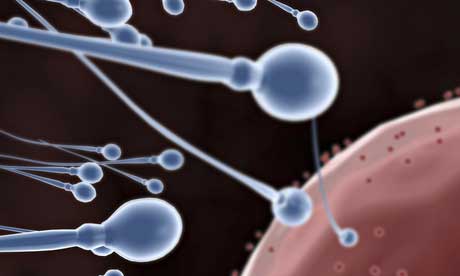
Scientists have made primitive forms of artificial sperm and eggs in a medical feat that could transform the understanding of age-related diseases and fertility problems.
科学家已于近日制造出人造精子和卵子的雏形。这一医疗壮举有望转变人们对于年龄相关疾病和生育问题的认识。
Researchers in Cambridge made the early-stage sex cells by culturing human embryonic stem cells under carefully-controlled conditions for a week.
剑桥大学的研究人员选取了人类胚胎干细胞,在严格控制实验环境的情况下通过一周的试验,终于培育出早期的生殖细胞。
They followed the success by showing that the same procedure can convert adult skin tissue into precursors for sperm and eggs, raising the prospect of making sex cells that are genetically matched to patients.
在取得初步成功后,研究人员认为同样的程序能够将成人皮肤组织培育成精子和卵子的前体细胞。应用这一研究成果则有望培育出与不孕不育症患者基因相匹配的生殖细胞,治疗不孕不育症的前景也因此被看好。
The cells should have the potential to grow into mature sperm and eggs, though this has never been done in the lab before. The next step for the researchers will be to inject the cells into mouse ovaries or testes to see if they fully develop in the animals.
科学家认为,尽管这项研究还从未在实验室中完成过,但他们相信这些早期生殖细胞能够成长为成熟的精子和卵子。研究项目的下一步,将是把早期生殖细胞注射到实验小鼠的生殖器官中,并观察它们能否发育完全。
British law prohibits fertility clinics in the UK from using artificial sperm and eggs to treat infertile couples. But if the law was revised, skin cells could potentially be taken from patients and turned into genetically identical sperm or eggs for use in IVF therapies.
英国法律禁止生育诊所使用人造精子和卵子对不孕不育夫妇进行治疗。但是如果对法律进行修订,就可以将病人的皮肤细胞转化为与其基因相同的生殖细胞,之后则采用试管婴儿疗法。
Skin cells from a woman could only be used to make eggs because they lack the Y chromosome. Those from a male might theoretically be turned into eggs as well as sperm, but Azim Surani, who led the work at the Gurdon Institute in Cambridge, said that on the basis of current knowledge, that was unlikely.
理论上讲,由于女性皮肤细胞没有Y型染色体,只能用来制造卵子;而男性皮肤细胞既可以转换成卵子,又能成为精子。此次研究由剑桥大学古尔登研究所(the Gurdon Institute)的阿齐姆·苏伦尼(Azim Surani)领导。但他表示,在现有的医学基础上,这一想法还很难实现。
Researchers have made sperm and eggs from rodent stem cells before but have struggled do the same with human cells. In 2012, Japanese scientists created mouse eggs from stem cells and used them to make baby mice. Three years earlier, scientists at Newcastle University claimed to have made human sperm from stem cells, but their scientific paper was retracted amid allegations of plagiarism. In 2002, US researchers produced male and female mouse pups from male stem cells.
研究人员先前曾用啮齿动物的干细胞制造精卵,但在人类细胞相关研究的过程却无比艰难。2012年,日本科学家利用老鼠干细胞培育生殖细胞,并以此繁衍出新生老鼠。2009年,纽卡斯尔大学(New castle University)的科学家就声称用人类干细胞培育出了精子,但所发论文涉嫌抄袭,被迫撤回。而早在2002年,美国科学家就用雄性老鼠干细胞培育出小老鼠。
(翻译:490252028 编辑:Helen)
